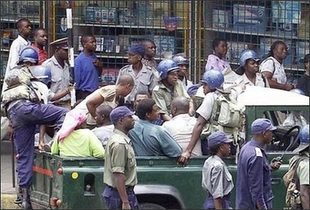
This report documents human rights violations experienced by female, male and transgender sex workers in four African countries (Kenya, Uganda, South Africa and Zimbabwe), and describes barriers they face to accessing health services. Through cross-country comparison and documenting sub-regional trends, the study moves beyond previous often-localised descriptions of violations against sex workers in Africa. The study also fills information gaps about violations in male and transgender sex workers in this setting.
A desk review of literature and policies pertaining to sex work in the study settings preceded individual in-depth interviews (n=55) and 12 focus group discussions (n=81) with sex workers above 18 years. Interviews covered the human rights violations sex workers experienced, strategies to avoid these, barriers to health services and practical suggestions for advocacy to improve these circumstances. Broader health (HIV) impacts were also examined. Salient demographic and sexual behaviour data were collected. Sex worker peer educators were trained to obtain narrative information through interviews with sex workers. Convenience sampling was used, aiming to enroll participants across diverse sex-work settings in each site. Interviews took place from December 2010 to February 2011 in Mombasa, Kenya; Hillbrow, Johannesburg, and the towns of Musina and Thohoyandou in Limpopo province, South Africa; Kampala, Uganda; and Bulawayo, Zimbabwe.
Results in brief
Around 60% of participants in Hillbrow and Limpopo were foreign migrants (mainly from Zimbabwe) and a substantial portion in other sites identified as internal migrants. Severe poverty and unemployment spurred many to enter the sex industry, but several cited the appeal of financial independence, and the means to support family members, pay school fees, or obtain finance for other income-earning ventures.
Sexual violence, perpetrated by police and related authorities, was common across all sites. Some sex workers (both female and male) had experienced this multiple times, often in the form of gang rape by police. Having to bribe the police, “all the time”, was deeply connected with sexual violence.
Men who sell sex to women (only found in Zimbabwe) reported less police harassment, but police abuse of other male sex workers was frequent, often marked by homophobia.
The few female sex workers who had ever laid charges against the police, reported being bribed, by as much as R2000, to drop charges. Most participants felt that it was futile to report abuses to the police (particularly if the perpetrators were police), since the response was often abusive in itself.
A range of people on the fringes of the sex industry take advantage of sex work criminalisation by extorting money or sex.
Clients, according to female SW, commonly ignored their wishes or the occurrence of pain. Moreover, clients (of female and male sex workers alike) across sites often refused to pay for services or tricked sex workers into accepting smaller payments. Virtually all had experienced physical beatings by clients or threats with firearms. Gang rape was common.
Once a sex worker’s occupation became known, they were usually despised by family and community members, and in some cases chased away from their homes. The children of female sex workers also appear to experience similar abuse.
Many reported being ostracised by religious institutions (both Christian and Muslim), at times in extreme forms, particularly in east Africa.
There was an understanding that the criminalisation of sex work renders sex workers largely powerless. Without exception, participants spoke of how the illegality of sex work deprived them of basic rights and impacted directly on their ability to avoid HIV. By distorting power balances between sex workers and police, criminalisation legitimates bribery, blackmail, humiliation, cruelty and sexual abuse by authorities. This generates deep fear about being exposed as SW, entrenching reluctance to go public with their experiences and claim their rights.
Female sex workers also called for improved access to pap smears and female condoms. Unplanned pregnancies were reported by a handful of female SW, usually resulting in abortion – commonly painfully self-induced with alcohol or medication bought from pharmacies. Several mentioned the need for services for injuries suffered after beatings and rape, but were often denied treatment. Sex workers’ profound vulnerability to HIV was clearly inseparable from the violence accompanying sex work and the broader context of patriarchy and criminality.
Sex workers described many instances of poor treatment once health providers – particularly those in public clinics and hospitals – became aware of their work. They were said to ask invasive and unnecessary questions of sex workers and frequently breached patient confidentiality. For many sex workers in this study, health providers were plainly described as “abusive” or “hostile”.
Private services, which were described – almost unanimously – as higher quality and as places where they would be treated with dignity and their confidentiality protected.
Not surprisingly, sex workers commonly chose not to disclose their occupation when interacting with health workers, but acknowledged that non-disclosure was ultimately a poor solution, as it undermined diagnostic accuracy and treatment effectiveness.
Sex workers in virtually every site except Hillbrow reported difficulties in accessing condoms, resorting to using expired or used condoms, or stopping work while condom shortages lasted. Few females reported lubricant use. Those familiar with lubricant were, however, unequivocal about how much it would benefit them. Men noted the importance of lubricants, but also its expense, and commonly resorted to oil-based lubricants (e.g. Vaseline), which damage latex condoms.
Participants emphasised the importance of local organisations dedicated to supporting sex workers and working alongside to advocate and seek legal redress to violations – including restrictions in accessing health services. Many called for ‘sex-worker specific’ or -friendly facilities.
Theme:
Human Rights and Law  ASWA_Report_HR_Violations_and_Healthcare_Barriers_14_April_2011.pdf
ASWA_Report_HR_Violations_and_Healthcare_Barriers_14_April_2011.pdf
Author:
Fiona Scorgie, Daisy Nakato, Daughtie Ogutu Akoth, Mpho Netshivhambe, Pamela Chakuvinga, Patience Nkomo, Phelister Abdalla, Sihle Sibanda, Marlise Richter

